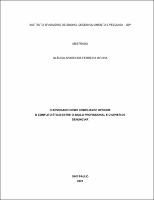Use este identificador para citar ou linkar para este item:
https://repositorio.idp.edu.br//handle/123456789/3831| Título: | O advogado como compliance officer: o conflito ético entre o sigilo profissional e o dever de denunciar |
| Autor(es): | Iacona, Gláucia Aparecida Ferreira |
| Orientador(es): | Cortez, Rafael de Paula Santos |
| Palavras-chave: | Compliance;Advogado;Compliance Officer;Conflito ético |
| Data de submissão: | 2022 |
| Citação: | IACONA, Gláucia Aparecida Ferreira. O advogado como compliance officer: o conflito ético entre o sigilo profissional e o dever de denunciar. 2022. 97 f. Dissertação (Mestrado profissional em Direito). – Instituto Brasileiro de Ensino, Desenvolvimento e Pesquisa, São Paulo, 2021. |
| Resumo: | O presente trabalho tem como objetivo refletir, através de uma revisão bibliográfica
qualitativa, sobre o tema: “O advogado como Compliance officer: O conflito ético entre
o sigilo profissional e o dever de denunciar”, apresentando a figura do Compliance e
o papel do advogado e a diferença que este profissional faz no dia a dia das empresas
e como deve se portar frente a uma divergência dentro desse mundo corporativo. Nas
esferas institucionais e corporativa, compliance está vinculado a estar em
conformidade com as leis e regulamentos internos e externos à organização. Com
isso, cada vez mais, o compliance vai além do simples atendimento à legislação e
busca consonância com princípios da empresa, alcançando a ética, a moral, a
honestidade e a transparência, não só na condução dos negócios, mas em todas as
atitudes das partes envolvidas. Conclui-se que a teoria do domínio criado pelo jurista
alemão Claus Roxin é um dos elementos essenciais para discussão da delimitação
para a condenação do delito cometidos pelo compliance officer já que são
imprescindíveis com relação a descoberta de quem efetivamente cometeu crimes
dolosos e o concurso dos agentes sem qualquer obscuridade quanto a autoria e a
coautoria na participação. Por fim, no Brasil o assunto ganhou destaque pela Ação
Penal 470 julgada pelo Supremo Tribunal Federal, na época conhecido Mensalão,
pela primeira vez citando o compliance officer que na época era responsável pelo
núcleo financeiro e acabou sendo culpado por ser um garante do banco Rural pelo
qual era funcionário. Atualmente tem sido tema de grande discussão devido a
insuficiente os critérios utilizados ao estabelecer a responsabilidade dos profissionais
de compliance officer. |
| Abstract: | This paper aims to reflect, through a qualitative bibliographic review, on the theme: “The lawyer as a Compliance officer: The ethical conflict between professional secrecy and the duty to report”, presenting the figure of Compliance and the role of the lawyer and the difference that this professional makes in the daily routine of companies and how they should behave in the face of a divergence within this corporate world. In the institutional and corporate spheres, compliance is bound to be in compliance with the laws and regulations internal and external to the organization. With this, more and more, compliance goes beyond simple compliance with legislation and seeks to comply with company principles, reaching ethics, morals, honesty and transparency, not only in the conduct of business, but in all attitudes of companies. related parties. It is concluded that the theory of dominance created by the German jurist Claus Roxin is one of the essential elements for discussion of the delimitation for the condemnation of the crime committed by the compliance officer since they are essential in relation to the discovery of who actually committed willful crimes and the contest of the agents without any obscurity as to authorship and co-authorship in participation. Finally, in Brazil the matter was highlighted by Criminal Action 470 judged by the Supreme Federal Court, at the time known Mensalão, for the first time citing the compliance officer who at the time was responsible for the financial nucleus and ended up being blamed for being a guarantor of the Rural bank for which he was an official. Currently, it has been the subject of much discussion due to the insufficient criteria used when establishing the responsibility of compliance officer professionals. |
| URI: | https://repositorio.idp.edu.br//handle/123456789/3831 |
| Aparece nas coleções: | Mestrado Profissional em Direito, Justiça e Desenvolvimento - São Paulo |
Arquivos associados a este item:
| Arquivo | Descrição | Tamanho | Formato | |
|---|---|---|---|---|
| DISSERTAÇÃO_ GLÁUCIA APARECIDA FERREIRA IACONA _MESTRADO EM DIREITO, JUSTIÇA E DESENVOLVIMENTO.pdf | 1.02 MB | Adobe PDF |  Visualizar/Abrir |
Os itens no repositório estão protegidos por copyright, com todos os direitos reservados, salvo quando é indicado o contrário.
